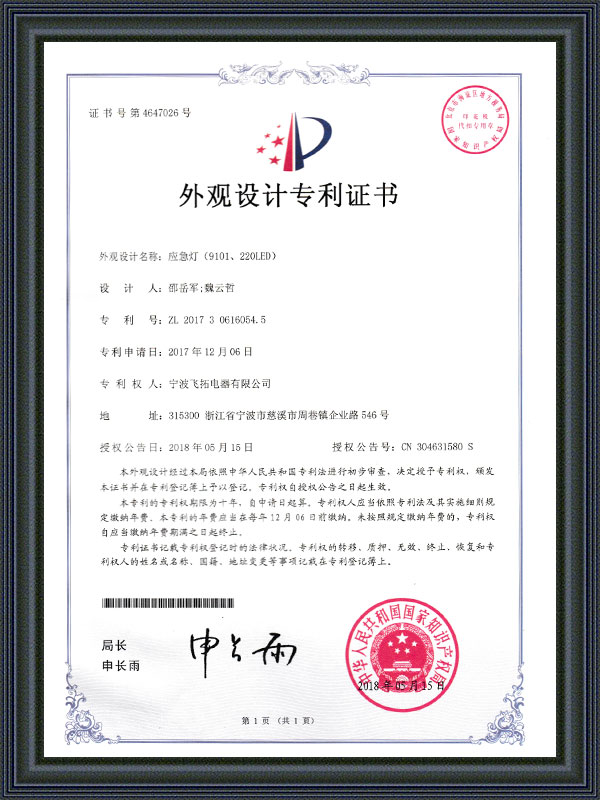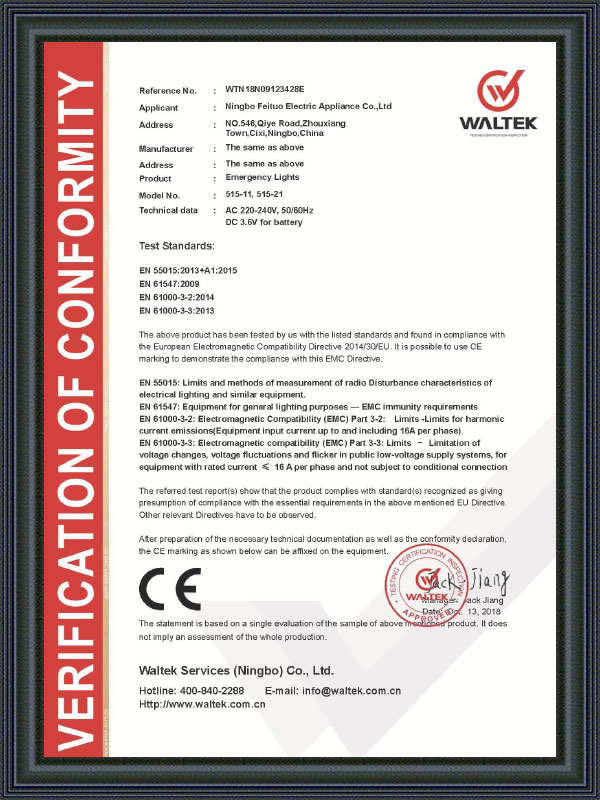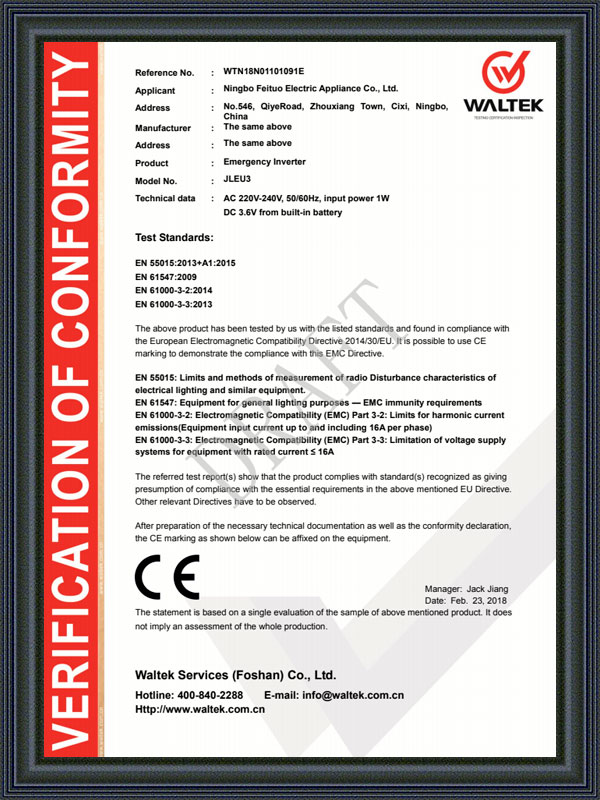แบตเตอรี่ลิเธียม
]ข้อมูลจะได้รับการอัปเดต
Ningbo FEITUO Electric Appliance Co., Ltd.
เราให้ใบรับรองที่เกี่ยวข้องเพื่อให้เป็นไปตามข้อกำหนดด้านความปลอดภัยของตลาดในท้องถิ่นเช่น CE / ROHS / UL เป็นต้น มีส่วนร่วมในอุตสาหกรรมไฟฉุกเฉินเป็นเวลา 54 ปียินดีต้อนรับ OEM/ ODM/ SKD
นับตั้งแต่ก่อตั้ง Feituo ไม่เคยหยุดเดินเพื่อแสวงหาคุณภาพ
-

0
ที่จัดตั้งขึ้น
-

0+
พนักงาน
-

02
โรงงานจีน
-

02
โรงงานเวียดนาม
-

0ชุด
กำลังการผลิต
ให้ความสนใจกับข่าวและนิทรรศการล่าสุดของเรา
-
การพัฒนาที่น่าตื่นเต้นและโอกาสการเป็นหุ้นส่วนระยะยาวในโซลูชั่นไฟฉุกเฉิน!
เราหวังว่าข้อความนี้จะพบคุณได้ดี เรารู้สึกตื่นเต้นที่ได้แบ่งปันการพัฒนาที่น่าตื่นเต้นจาก บริษัท ของเราซึ่งเป็นผู้ผลิตชั้นนำของป...
-
บทสรุปที่ประสบความสำเร็จของงาน Lantern Autumn Lantern ฮ่องกง!
งาน Lantern Autumn Fair ฮ่องกงซึ่งเป็นงานที่โดดเด่นซึ่งเป็นจุดสนใจของอุตสาหกรรมแสงสว่างดึงผู้เข้าร่วมงานและผู้เข้าชมจำนว...
-
ส่องสว่างด้วยประสิทธิภาพ: วิทยาศาสตร์ที่อยู่เบื้องหลังไฟฉุกเฉิน LED
ในขอบเขตของแสงฉุกเฉินสัญญาณของประสิทธิภาพนั้นนำโดยยุคก้าวหน้าของ ไฟฉุกเฉิน LED - เบื้องหลังอุปกรณ์ที่ให้แสงสว่างเหล่านั้...
-
นวัตกรรมการอพยพ: บทบาทของการลงชื่อออกฉุกเฉิน LED ในสถานการณ์ฉุกเฉิน
ในระหว่างประเทศที่รวดเร็วและคาดเดาไม่ได้ที่เราอยู่ในความปลอดภัยเป็นสิ่งสำคัญยิ่ง รายละเอียดที่สำคัญอย่างหนึ่งในการรับรองความเป็...
-
ส่องสว่างเส้นทางของคุณ: ไฟฉุกเฉินแบบพกพาสำหรับทุกโอกาส
ในภูมิทัศน์ที่คาดเดาไม่ได้ของเหตุฉุกเฉินการมีโซลูชันแสงที่เชื่อถือได้และหลากหลายเป็นสิ่งสำคัญยิ่ง แนะนำล้ำสมัยของเรา ไฟฉุกเ...
-
ปลดปล่อยพลังที่ยั่งยืน: ความยืดหยุ่นของแบตเตอรี่ตะกั่วกรดแบบชาร์จไฟได้
ในขอบเขตของการจัดเก็บพลังงาน แบตเตอรี่ตะกั่วกรดแบบชาร์จไฟได้ โดดเด่นในฐานะแชมป์ที่แข็งแกร่งรวมถึงสาระสำคัญของพลังอันยาวน...
-
มีประสิทธิภาพและเป็นมิตรกับสิ่งแวดล้อม: เปิดตัวข้อดีของแบตเตอรี่ตะกั่วแบบชาร์จไฟได้
ในภูมิทัศน์ที่มีการพัฒนาตลอดเวลาของโซลูชั่นการจัดเก็บพลังงานแบตเตอรี่ตะกั่วกรดที่ชาร์จไฟได้โดดเด่นเป็นตัวเลือกที่เชื่อถือได้และ...
มีโครงการในใจ?
ไปทำงานกันเถอะ!
ติดต่อ
อุตสาหกรรม การขยายความรู้
What are the considerations for the application of ternary lithium battery technology in energy storage systems?
As an energy storage solution for energy storage systems, ternary lithium battery technology has received widespread attention for its superior performance in many aspects. Its application requires careful consideration of a series of key factors to ensure that the energy storage system can provide efficient, safe, reliable and cost-effective electrical energy storage.
The high energy density of ternary lithium batteries is an important advantage for their wide application in energy storage systems. Energy storage systems usually require the storage of large amounts of electrical energy in a limited space to cope with peak and valley differences in power demand or to provide backup power. With its relatively high energy density, ternary lithium batteries enable the system to store more electrical energy in a smaller physical volume, thereby effectively solving the challenge of space constraints.
Ternary lithium batteries tend to exhibit long cycle life, which is one of the crucial considerations in energy storage system design. Energy storage systems need to withstand thousands of charge and discharge cycles during their lifetime, and the superior cycle life of ternary lithium batteries ensures that the system can continue to provide stable performance, prolongs the service life of the system, and reduces maintenance and replacement costs.
The ability to charge and discharge quickly is another outstanding feature of ternary lithium batteries in energy storage systems. Energy storage systems sometimes need to be charged or discharged quickly over short periods of time to meet peak grid demand or to provide emergency backup power. The relatively good fast charge and fast discharge performance of ternary lithium batteries make them ideal for handling these high power demands, providing flexibility and response speed to the system.
In the design of energy storage systems, safety is one of the primary considerations. The relatively high safety of ternary lithium batteries stems from its stable voltage characteristics and low self-heating rate. This reduces the risk of fire and explosion and provides a reliable electrical energy storage solution for energy storage systems.
The good temperature characteristics of ternary lithium batteries also make them popular in energy storage systems. Energy storage systems may be exposed to a variety of ambient temperature conditions, so the performance of the battery needs to match its operating environment. Ternary lithium batteries have excellent performance at different temperatures, ensuring their reliable operation in various climate conditions.
System integration is another consideration in energy storage system design. Ternary lithium batteries need to be effectively integrated with other components such as battery management systems (BMS) to ensure safe operation, balanced charge and discharge, and status monitoring of the battery. This requires designers to implement coordinated control and management strategies throughout the system to maximize the benefits of ternary lithium battery technology.
]ข้อมูลจะได้รับการอัปเดต








